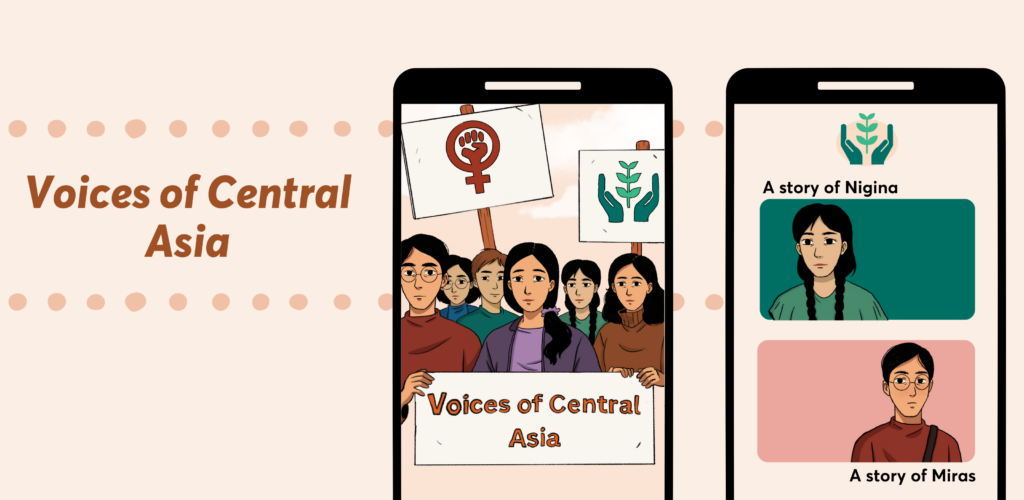PLAYING FOR A BETTER CENTRAL ASIA: INTRODUCING VOICES OF CENTRAL ASIA
Do you know what lies beyond the mainstream media’s headlines when it comes to Central Asia? Are you curious to learn more about the human rights issues in this region? If so, you should try out a new free game app, Voices of Central Asia.
The app has been created by the Central Asia Solidarity Groups (CAG), a non-profit organization based in Sweden working to promote active and inclusive civil society in Central Asia that supports human rights and social justice. The game is designed to raise awareness about human rights issues in the region. “The project was created to spread information about the region; what kind of organizations are there, and what type of topics and situations they are focused on – to spread and increase attention, and get more engagement from people”, says Tatiana Stebneva, who led and coordinated the process of creating the app. With its focus on questions related to gender equality, freedom of speech, migration, youth, environment, security and more, the app Voices of Central Asia aims to give voice to discriminated communities and shed light on local civil society initiatives.

Voices of Central Asia is part of information and advocacy work of CAG. Currently, Central Asia remains largely unknown to the European public. It is often overlooked and exoticized by international media, and when included, it is generally about gloomy causes – reinforcing a negative image of the region. “The app was made for Sweden to inform people about what is happening in Central Asia. But the app has now expanded its reach to other countries in Europe and Central Asia – spreading purpose and information related to our partner organizations”, explains Stebneva. The lack of awareness is reflected in the limited priority given to Central Asia by the general public, academia, and the international aid community, which leads to a lack of resources for the region. As a result, local civil society organizations struggle to get funding and support, while continuing to work with local communities and striving to influence decision-making processes.
For this reason, CAG takes a lot of effort in the organization’s information and advocacy project – to raise awareness about Central Asia in Sweden and beyond. “Using a game-based approach, Voices of Central Asia aims to encourage people everywhere to learn about human rights and Central Asia in an engaging way”, says Stebneva, and explains how the mission is to create a more informed and aware public that can take action to support local civil society organizations in Central Asia, and advocate for the human rights of marginalized communities.
The game contains seven storylines that invite players to take on the role of various characters, making choices that shape the outcome of their stories. The storylines are based on reports from local non-governmental organizations and CAG’s collaboration projects with civil society in the region, giving voices to the issues that they have raised. While navigating through the game’s stories, players are introduced to background information on each topic, which allows them to gain a deeper and more nuanced understanding of the current situation in Central Asia.
Storylines have a big potential to influence people’s attitudes towards an issue, owing to their engaging nature. “With Voices of Central Asia we aim to bring attention to pressing matters, such as the problem of bride kidnapping in Kyrgyzstan and water scarcity in the region. The goal is to not only make sure that the serious message gets through, but to also keep the players invested and engaged”, Stebneva explains.
By stepping into the shoes of different characters through the game, players can experience perspectives and contexts different from theirs, which gives them a better understanding of the complexities of human rights challenges in Central Asia, and encourages the players to reflect on their own privileges and biases. “An example of this could be playing a storyline focused on the environment”, says Stebneva, and explains how Central Asia is one of the global regions which are most severely affected by climate change. When the players navigate through the life of a character living in an area particularly vulnerable to the impacts of this global crisis, they can get a better grasp of its urgency and consequences. “In addition to bringing attention to these issues, we also highlight the initiatives aimed at addressing them”, says Sebneva. For example, the game features organizations that CAG has been working with to tackle environmental issues, encouraging players to support these initiatives and bring positive change.
CAG plans to update the Voices of Central Asia app with additional storylines in the coming months and years, focusing on more issues connected to gender equality, environment and climate, security and resilience, and democratic youth organizing in Central Asia. The goal is to reach a broader audience to drive change and promote democratic Central Asia and a more just world.
Voices of Central Asia is available in English and Swedish and can be downloaded on both Google Play and the App Store. It is a useful resource for everyone who wants to deepen their understanding of the civil society landscape and human rights challenges in Central Asia. Visit CAG’s webpage if you would like to know more about the work of the organization. Tatiana Sebneva encourages people to try the app and grow their knowledge: “Play now and become an informed advocate for a better Central Asia!”
by Johan Blomqvist
